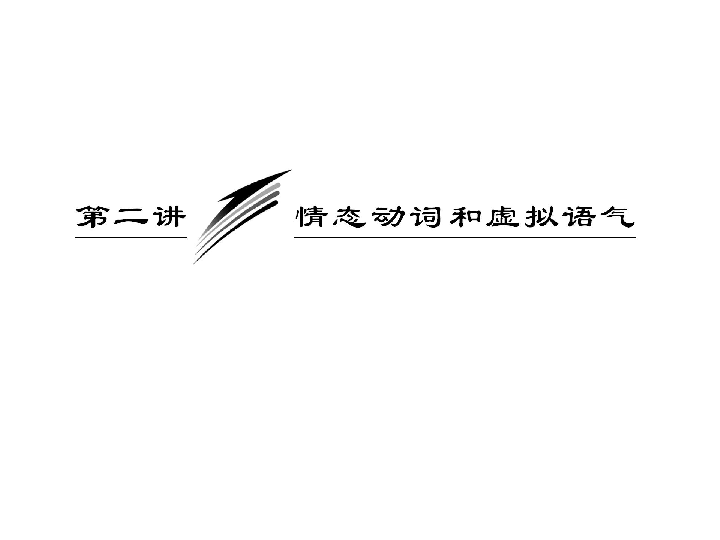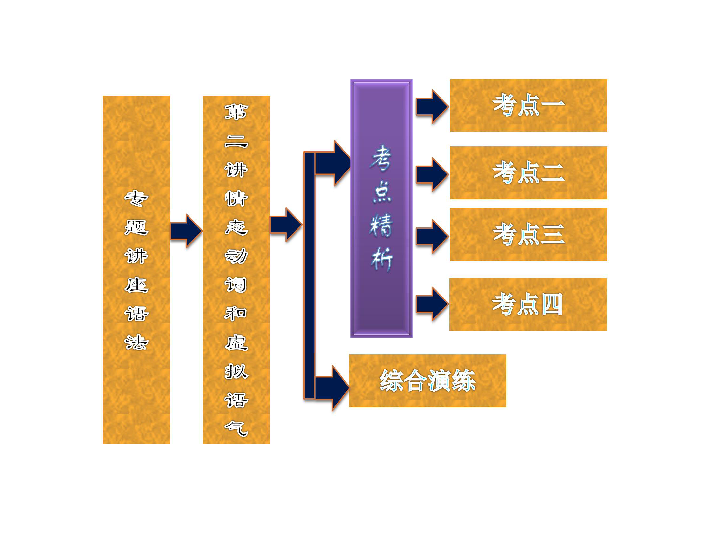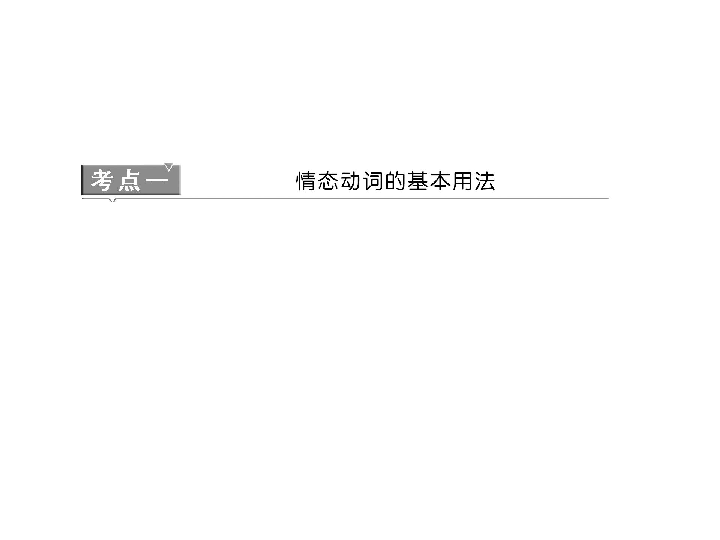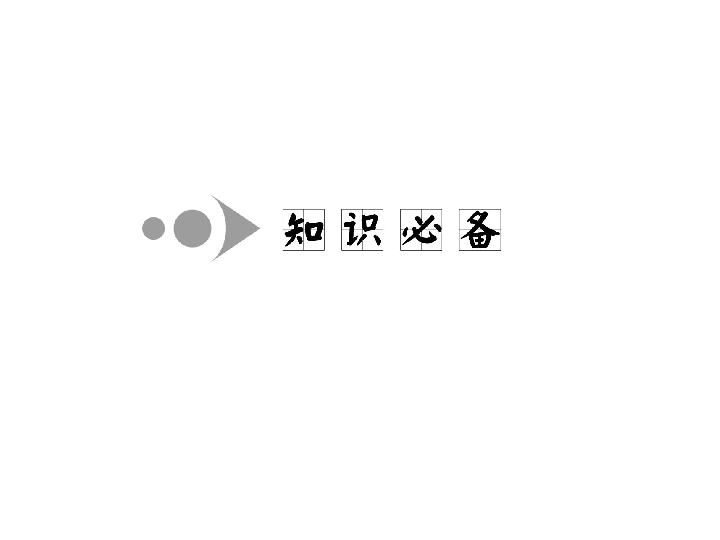人教版)(英语)2013届高三复习语法专题讲座:第2讲 情态动词和虚拟语气
文档属性
| 名称 | 人教版)(英语)2013届高三复习语法专题讲座:第2讲 情态动词和虚拟语气 |  | |
| 格式 | zip | ||
| 文件大小 | 2.1MB | ||
| 资源类型 | 教案 | ||
| 版本资源 | 人教版(新课程标准) | ||
| 科目 | 英语 | ||
| 更新时间 | 2013-03-20 15:55:57 | ||
图片预览





文档简介
课件92张PPT。专
题
讲
座
语
法综合演练第
二
讲
情
态
动
词
和
虚
拟
语
气考点一考点二考点三考点四1.can 和could的用法
(1)表示“能力”。
— No one can be compared with Yao Ming in playing basketball.
— Oh, you are really his big fan.(摘自2011湖南高考)
——在打篮球方面,无人能与姚明相媲美。
——你真是姚明的铁杆粉丝。(2)表示惊讶,常用在否定句和疑问句中。
How could you do such a silly thing?
你怎么能做那样的蠢事呢?(3)cannot ... too/enough表示“无论……也不过分”;“越……
越好”。
You can't be too careful while driving.
开车时越小心越好。2.may和might的用法
(1)may和might表示“许可”,“可能性”,“祝愿”等意义。
①在给予别人许可时,常用can,但有时也用may。不能用might。
— May I take the book out?
— I'm afraid not.(摘自2010四川高考)
——我能将书带出吗?
——恐怕不行。②“may as well+动词原形”意为“最好;满可以;倒不如”。
We may as well stay where we are.
我们留在现在的地方倒也不错。(2)may作“可以”讲时,其否定式常用“mustn't”表示“禁止”;
must作“必须”讲时,其否定式是“needn't”,表示“不必”。
— May I take this book out of the reading room?
— No, you mustn't. You read it in here.(摘自2010陕西高考)
——我可以把书拿出阅览室吗?
——不,决不可以,你在这儿读。3.must的用法
(1)表示禁止(用于否定句)。
You mustn't park here! It's an emergency exit.(摘自2010重庆高考)
你不可以在这儿停车!这是紧急情况出口处。(2)表示“偏执”;“固执”。
Don't interrupt me, John. Must you force me to tell you the truth at the moment?
约翰,你别打断我说话。你非得逼我这时告诉你真相吗?4.shall的用法
(1)用于第一、第三人称疑问句中,表示说话人征求对方的
意见和向对方请示。
— What time shall I pick you up at your house tomorrow, sir?
— I haven't decided on the time.But I will call you.
——先生,我明天什么时候到你家接你呢?
——我还没有决定时间,但是我会给你打电话的。(2)用于第二、第三人称陈述句中,表示说话人给对方的命
令、警告、允诺或威胁。
No driving electric motor bikes in some areas is a rule that you shall obey in Fuzhou.
在一些地区不许骑电动车是你在福州必须遵守的一个规定。5.will和would的用法
作情态动词的will, would与作助动词的will, would的各种形式相同。
(1)表示自愿做或主动提出做什么,如意志、愿望或决心
等。would用于过去的情况。
John promised his doctor he would not smoke, and he has never smoked ever since.(摘自2008北京高考)约翰答应他的医生不再吸烟了,自从那时起他就再也不吸烟了。
I have told him again and again to stop smoking, but he will not listen.
我已再三告诉他戒烟,但是他就是不听。(2)will可以表示一种习惯性的动作,有“总是”或“总要”之意。
Every morning he will have a walk along this river.
每天早晨,他总是沿着小河散步。(3)would 可以表示过去的习惯性动作,比used to正式,
但没有“现已无此习惯”的含义。
When we worked in the same firm several years ago, we would often go to the cinema together.
当几年前我们在同一家公司工作时,我们常常一起去电影院。1.(2011·陕西高考)— Will you read me a story, Mummy?
— OK. You ________ have one if you go to bed as soon as possible.
A.might B.must
C.could D.shall 解析:考查情态动词。句意:“妈妈,给我讲个故事好吗?”“好的,如果你尽快上床睡觉我就给你讲一个。”shall用于陈述句中的第二、第三人称,表示说话人的意图、允诺、警告、命令、决心等,意为“必须;应;可”。答案:D2.(2011·福建高考)— Shall I inform him of the change of
the schedule right now?
— I am afraid you ________, in case he comes late for the meeting.
A.will B.must
C.may D.can解析:考查情态动词。依据 in case he comes late for the meeting 可知,这里用 must 表示“必须”,强调提醒时间安排变化的“必要性”。答案:B3.(2011·上海高考)I ________ worry about my weekend —
I always have my plans ready before it comes.
A.can't B.mustn't
C.daren't D.needn't解析:考查情态动词。句意:我不必担心我的周末——我总是在周末来临之前就计划好了。根据下文可知D项“没有必要”符合语境。A项“不能;不可能”;B项“禁止”;C项“不敢”。答案:D4.(2011·辽宁高考)If you ________go, at least wait until
the storm is over.
A.can B.may
C.must D.will解析:考查情态动词。句意:如果你非要走的话,至少等到暴风雨结束。根据句意可知must (一定要)正确。can “能够”; may “或许”; will “将要”。答案:C5.(2011·重庆高考)— Why didn't you come to Simon's
party last night?
— I wanted to, but my mom simply________not let me out so late at night.
A.could B.might
C.would D.should解析:考查情态动词。 问话人询问为什么昨晚没有参加Simon的聚会,答话人回答说自己想去,但是妈妈只是不想让自己在这么晚的时候出去。 此处表示的是过去的意愿,因此用would。 答案:C1.can用于肯定句中有时可以用来表示推测,意为“有时会
”;用于疑问句中可以表示推测,意为“可能”,有时表示一种惊讶的语气;用于否定句中也可以表示推测,can't 意为“不可能”,语气很强烈。It is usually warm in my hometown in March, but it can be rather cold sometimes.
我的家乡在三月份通常很暖和,但有时候也会相当冷。
Mr.Bush is on time for everything.How can it be that he was late for the meeting?
布什先生做什么事情都很准时,他怎么可能开会迟到呢?
I'm afraid Mr.Harding can't see you now. He's busy.(摘自2010全国卷Ⅱ)
恐怕Mr.Harding现在不能见你,他很忙。2.may用于肯定句中可以用来表示推测,意为“可能”;用
于否定句中也可以表示推测,may not意为“可能不”,表示一种不太确定的语气。
The traffic is heavy these days. I might arrive a bit late, so could you save me a place?(摘自2009辽宁高考)这些天交通很繁忙,我可能会来晚一点,请你帮我保留个位置好吗?
Some people who don't like to talk much are not necessarily shy; they may just be quiet people.(摘自2009安徽高考)
言语不多的人未必就是害羞。他们或许就是安静的人。3.must 表示推测时只能用于肯定句中,意为“一定;必定
”,表示十分肯定的语气(在疑问句中或否定句中要用can)。
—It's the office!So you must know eating is not allowed here.
—Oh, sorry.(摘自2009湖南高考)
——这是办公室!所以你一定知道这里不许吃东西。
——噢,对不起。4.should 用来表示推测时意为“应该”,即含有“按道理来说
应当如此”的意思。
There shouldn't be any difficulty about passing the road
test since you have practiced a lot in the driving school.
因为你在驾校训练了那么多,通过路考应该没什么困难。1.(2011·江西高考)It ________be the postman at the
door.It's only six o'clock.
A.mustn't B.can't
C.won't D.needn't解析:考查情态动词。句意:门口不可能是邮递员,(现在)才六点钟。 对现在的否定推测,由It's only six o'clock.分析可知应用can't(不可能)。mustn't“禁止”; won't“不会”; needn't“不必”,均不合句意。 答案:B2.(2011·北京高考)— I don't really like James. Why did
you invite him?
— Don't worry. He ________ come. He said he wasn't certain what his plans were.
A.must not B.need not
C.would not D.might not解析:考查情态动词。根据句意可知,James 不太确定他的计划,他可能不来。might not 表示“可能不”,符合语境。 答案:D3.(2010·北京高考)— Good morning. I've got an
appointment with Miss Smith in the Personnel Department.
— Ah, good morning. You ________ be Mrs. Peters.
A.might B.must
C.would D.can解析:考查情态动词。第一句说明和史密斯女士有约定,所以秘书判断一定是……。must在此表示推测,意为“一定”,符合语境。答案:B4.(2012·潍坊市模拟)Don't worry. I've just sent an
ambulance to you. They ________ be there any second.
A.could B.might
C.would D.should解析:考查情态动词。既然已经派去了救护车,那么他们“应该”随时会赶到。should在本句中表示预期“应该会;可能”。答案:D1.can/could have done表示“本来可以做,而实际上未做”或
者“过去可能”,疑问或否定形式表示对过去发生的行为表示怀疑或不肯定,其中can't have done多用于语气强烈的否定,意为“不可能做过”。— Do you know where David is?I couldn't find him anywhere.
— Well.He can't have gone far — his coat's still here.
——你知道大卫在哪里吗?我到处找不到他。
——大卫的上衣还在这里,因此他肯定没走远。
I could have saved the poor rabbit, but I didn't have the right drugs with me at that moment.
我本来可以拯救那只可怜的兔子的,可是我当时没有合适的药品。2.may/might have done表示对过去行为的推测,意为“可
能做过”。might所表示的可能性比较弱,语气较委婉。此外might have done可表示“本可能做而实际上未做”。
Sorry, I'm late.I might have turned off the alarm clock and gone back to sleep again.
对不起,我迟到了。我可能把闹钟关掉后又睡着了。3.must have done表示对过去行为的推测,意为“一定;想
必”,语气十分肯定。
Jack described his father, who must have been a brave boy many years ago, as a strong-willed man.(摘自2010安徽高考)
杰克说他父亲是个意志坚强的人,多年前他父亲一定是个勇敢的男孩子。4.should have done表示过去本来应该做某事而实际上却
没有做;shouldn't have done表示过去本来不应该做某事而实际上却做了。这一用法往往含有责备的意味。
I shouldn't have watched that movie — it'll give me horrible dreams.(摘自2010山东高考)
我本不应该看那部电影——它会令我做噩梦。5.ought to have done表示过去本来应该做某事而实际上却
没有做;ought not to have done表示过去本来不应该做某事而实际上却做了。这一用法与should相同,也往往含有责备的意味。
You ought to have come to the party yesterday, but why didn't you come?
昨天你本来应该参加聚会的,可是你为什么不来?6.needn‘t have done表示本来不必做某事而实际上却做了。
Mark needn't have hurried. After driving at top speed, he arrived half an hour early.(摘自2010天津高考)
马克本没必要那么匆忙。他以最快速度开车,结果早到了半个小时。1.(2011·新课标全国卷)They ________have arrived at
lunchtime but their flight was delayed.
A.will B.can
C.must D.should解析:考查情态动词。句意:他们本应该在午饭时间到达,但是他们的航班推迟了。should have done 表示“本应该做某事(实际却未做)”,符合句意。答案:D2.(2011·江苏高考)— I left my handbag on the train, but
luckily someone gave it to a railway official.
— How unbelievable to get it back! I mean, someone________it.
A.will have stolen B.might have stolen
C.should have stolen D.must have stolen解析:考查情态动词。从对话情景可知他们在谈论过去的可能性:有人可能把手提包偷走了,因此选择might have stolen。答案:B3.(2012·潍坊市抽样监测)— They ________ have prepared
for the meeting more carefully.
— But they didn't. What a pity!
A.shouldn't B.can't
C.may D.ought to解析:考查情态动词。句意:“他们本该更细心地准备会议的。”“但他们没有这样做。真可惜!”ought to have done “过去本该做某事而未做”。答案:D4.(2012·日照高三调研)We ________ have hurried all the
way to the airport — the flight was called off because of the foggy weather.
A.mustn't B.couldn't
C.needn't D.wouldn't解析:考查情态动词。needn't have done表示“过去本不必做,但实际上却做了”。句意:我们原本没必要匆忙赶到机场——航班因为大雾天气取消了。答案:C1.非真实条件句中虚拟语气的用法If I had time, I would attend your party.
如果我有时间,我就去参加你的宴会了。
If we had taken the other road, we might have arrived here in time for the meeting.(摘自2010陕西高考)
要是我们走其他的路,我们有可能及时到达这儿参加会议。
If it snowed/were to snow/should snow tomorrow, we would take photos.
如果明天下雪,我们就照相。[点津] 若条件句中有were, had, should,可把if省略,而把were, had, should放在主语前,形成倒装结构,这种结构主要用于书面语中。
Had I known about this computer program, a huge amount of time and energy would have been saved.(摘自2010浙江高考)要是我了解电脑程序,会节省大量的时间和能源。
Should it rain tomorrow, we would have to cancel the football match.
如果明天下雨,我们将不得不取消足球赛。2.错综时间虚拟条件句
If you had worked hard, you would be very tired now.
如果你真的努力工作了,你现在就会感到很累的。(从句指过去,主句指现在)3.含蓄虚拟语气
有时假设的情况并不用条件从句表达,而是由otherwise, but, or, without, but for等来引导。
But for their help, we could not have finished the program in time.
要不是他们的帮助,我们不可能及时完成这个项目。The change could not have taken place without the open-door policy.
要是没有开放政策,就没有这些变化。
I was so busy then, otherwise I would have gone to help him.
那时我太忙了,否则我就去帮他了。4.某些从句中虚拟语气的用法
(1) 表示命令、建议、要求、愿望等含义的动词后宾语从句
和同位语从句时用虚拟语气,形式为:(should+)动词原形。常这样用的动词有:advise劝告,demand要求,desire渴望,command命令,insist坚决要求,prefer宁愿,urge主张,order命令,recommend 劝告;建议,request要求,require要求,suggest建议,以及这些词的名词形式。Teachers recommend parents not allow their children under 12 to ride bicycles to school for safety.(摘自2010福建高考)
老师们建议父母,为了安全不要让他们12岁以下的孩子骑车上学。(2)wish后跟宾语从句时用虚拟语气。
对现在情况的假设: wish+主语+动词过去式(be用were)
对过去情况的假设: wish+主语+had+过去分词
对将来情况的假设: wish+主语+would+动词原形— How much of the foreign expert's speech have you understood?
— Next to nothing. I wish I had worked harder at English.
——外国专家的演讲你懂多少?
——几乎什么也不懂,要是我过去更刻苦学习英语就好了。(3)would rather后跟从句时用虚拟语气,表示愿望,意为
“宁愿;但愿”。
George is going to talk about the geography of his country, but I'd rather he focused more on its culture.(摘自2010江苏高考)
乔治将要谈论关于他的国家的地理情况,但是我宁愿他更多地谈它的文化(方面的情况)。(4)在“It is (about/high) time+that从句”中,谓语动词常
用过去式表示虚拟语气。
It is high time that people learnt English.
到了人们该学英语的时候了。(5) 在as if从句中,看语境是否与事实相反而选择是否
使用虚拟语气。
It looks as if it's going to rain.
天看上去似乎要下雨。
She talked about it again and again as if she would never end.
她反复谈论那件事,好像永远也谈不完的样子。(6)if only 引导的感叹句中,用虚拟语气表示愿望。
Look at the trouble we're in. If only we had taken our teacher's advice!
看看我们所处的困境,要是我们接受老师的建议就好了。1.(2011·江西高考)We ________ John's name on the race
list yesterday but for his recent injury.
A.will put B.will have put
C.would put D.would have put解析:考查虚拟语气。句意:要不是他目前的伤情,我们昨天就会把约翰的名字列到比赛的名单中了。 but for表示“要不是”,根据 yesterday可知此处表示与过去事实相反的假设,结合选项可知主句谓语动词应用 would+ have done,故选D。 答案:D2.(2011·北京高考)— Where are the children? The
dinner's going to be completely ruined.
— I wish they________always late.
A.weren't B.hadn't been
C.wouldn't be D.wouldn't have been解析:考查虚拟语气。根据问句句意“孩子们现在在哪里?” 可知wish 后的宾语从句应用动词的过去式,表示与现在事实相反的愿望,故答案为A。答案:A3.(2011·陕西高考)I ________through that bitter period
without your generous help.
A.couldn't have gone B.didn't go
C.wouldn't go D.hadn't gone 解析:考查虚拟语气。英语中, without, with, or, otherwise 等可构成含蓄虚拟语气,相当于条件状语从句“If it hadn't been your generous help”,表示与过去事实相反,此时句中的谓语动词应用should/could/would +have+过去分词。据此可知A项当选。句意:假如当时没有您慷慨相助,我就不会渡过那段艰难的时期。答案:A4.(2011·福建高考)— Pity you missed the lecture on
nuclear pollution.
— I________it, but I was busy preparing for a job interview.
A.attended B.had attended
C.would attend D.would have attended解析:考查虚拟语气。由 but I was busy preparing for a job interview 可知,答话人由于忙着准备求职面试,并未去听讲座,由此可知空处是对过去情况的假设,所以空处应用“情态动词+ have done”结构。答案:D点击此图片进入
题
讲
座
语
法综合演练第
二
讲
情
态
动
词
和
虚
拟
语
气考点一考点二考点三考点四1.can 和could的用法
(1)表示“能力”。
— No one can be compared with Yao Ming in playing basketball.
— Oh, you are really his big fan.(摘自2011湖南高考)
——在打篮球方面,无人能与姚明相媲美。
——你真是姚明的铁杆粉丝。(2)表示惊讶,常用在否定句和疑问句中。
How could you do such a silly thing?
你怎么能做那样的蠢事呢?(3)cannot ... too/enough表示“无论……也不过分”;“越……
越好”。
You can't be too careful while driving.
开车时越小心越好。2.may和might的用法
(1)may和might表示“许可”,“可能性”,“祝愿”等意义。
①在给予别人许可时,常用can,但有时也用may。不能用might。
— May I take the book out?
— I'm afraid not.(摘自2010四川高考)
——我能将书带出吗?
——恐怕不行。②“may as well+动词原形”意为“最好;满可以;倒不如”。
We may as well stay where we are.
我们留在现在的地方倒也不错。(2)may作“可以”讲时,其否定式常用“mustn't”表示“禁止”;
must作“必须”讲时,其否定式是“needn't”,表示“不必”。
— May I take this book out of the reading room?
— No, you mustn't. You read it in here.(摘自2010陕西高考)
——我可以把书拿出阅览室吗?
——不,决不可以,你在这儿读。3.must的用法
(1)表示禁止(用于否定句)。
You mustn't park here! It's an emergency exit.(摘自2010重庆高考)
你不可以在这儿停车!这是紧急情况出口处。(2)表示“偏执”;“固执”。
Don't interrupt me, John. Must you force me to tell you the truth at the moment?
约翰,你别打断我说话。你非得逼我这时告诉你真相吗?4.shall的用法
(1)用于第一、第三人称疑问句中,表示说话人征求对方的
意见和向对方请示。
— What time shall I pick you up at your house tomorrow, sir?
— I haven't decided on the time.But I will call you.
——先生,我明天什么时候到你家接你呢?
——我还没有决定时间,但是我会给你打电话的。(2)用于第二、第三人称陈述句中,表示说话人给对方的命
令、警告、允诺或威胁。
No driving electric motor bikes in some areas is a rule that you shall obey in Fuzhou.
在一些地区不许骑电动车是你在福州必须遵守的一个规定。5.will和would的用法
作情态动词的will, would与作助动词的will, would的各种形式相同。
(1)表示自愿做或主动提出做什么,如意志、愿望或决心
等。would用于过去的情况。
John promised his doctor he would not smoke, and he has never smoked ever since.(摘自2008北京高考)约翰答应他的医生不再吸烟了,自从那时起他就再也不吸烟了。
I have told him again and again to stop smoking, but he will not listen.
我已再三告诉他戒烟,但是他就是不听。(2)will可以表示一种习惯性的动作,有“总是”或“总要”之意。
Every morning he will have a walk along this river.
每天早晨,他总是沿着小河散步。(3)would 可以表示过去的习惯性动作,比used to正式,
但没有“现已无此习惯”的含义。
When we worked in the same firm several years ago, we would often go to the cinema together.
当几年前我们在同一家公司工作时,我们常常一起去电影院。1.(2011·陕西高考)— Will you read me a story, Mummy?
— OK. You ________ have one if you go to bed as soon as possible.
A.might B.must
C.could D.shall 解析:考查情态动词。句意:“妈妈,给我讲个故事好吗?”“好的,如果你尽快上床睡觉我就给你讲一个。”shall用于陈述句中的第二、第三人称,表示说话人的意图、允诺、警告、命令、决心等,意为“必须;应;可”。答案:D2.(2011·福建高考)— Shall I inform him of the change of
the schedule right now?
— I am afraid you ________, in case he comes late for the meeting.
A.will B.must
C.may D.can解析:考查情态动词。依据 in case he comes late for the meeting 可知,这里用 must 表示“必须”,强调提醒时间安排变化的“必要性”。答案:B3.(2011·上海高考)I ________ worry about my weekend —
I always have my plans ready before it comes.
A.can't B.mustn't
C.daren't D.needn't解析:考查情态动词。句意:我不必担心我的周末——我总是在周末来临之前就计划好了。根据下文可知D项“没有必要”符合语境。A项“不能;不可能”;B项“禁止”;C项“不敢”。答案:D4.(2011·辽宁高考)If you ________go, at least wait until
the storm is over.
A.can B.may
C.must D.will解析:考查情态动词。句意:如果你非要走的话,至少等到暴风雨结束。根据句意可知must (一定要)正确。can “能够”; may “或许”; will “将要”。答案:C5.(2011·重庆高考)— Why didn't you come to Simon's
party last night?
— I wanted to, but my mom simply________not let me out so late at night.
A.could B.might
C.would D.should解析:考查情态动词。 问话人询问为什么昨晚没有参加Simon的聚会,答话人回答说自己想去,但是妈妈只是不想让自己在这么晚的时候出去。 此处表示的是过去的意愿,因此用would。 答案:C1.can用于肯定句中有时可以用来表示推测,意为“有时会
”;用于疑问句中可以表示推测,意为“可能”,有时表示一种惊讶的语气;用于否定句中也可以表示推测,can't 意为“不可能”,语气很强烈。It is usually warm in my hometown in March, but it can be rather cold sometimes.
我的家乡在三月份通常很暖和,但有时候也会相当冷。
Mr.Bush is on time for everything.How can it be that he was late for the meeting?
布什先生做什么事情都很准时,他怎么可能开会迟到呢?
I'm afraid Mr.Harding can't see you now. He's busy.(摘自2010全国卷Ⅱ)
恐怕Mr.Harding现在不能见你,他很忙。2.may用于肯定句中可以用来表示推测,意为“可能”;用
于否定句中也可以表示推测,may not意为“可能不”,表示一种不太确定的语气。
The traffic is heavy these days. I might arrive a bit late, so could you save me a place?(摘自2009辽宁高考)这些天交通很繁忙,我可能会来晚一点,请你帮我保留个位置好吗?
Some people who don't like to talk much are not necessarily shy; they may just be quiet people.(摘自2009安徽高考)
言语不多的人未必就是害羞。他们或许就是安静的人。3.must 表示推测时只能用于肯定句中,意为“一定;必定
”,表示十分肯定的语气(在疑问句中或否定句中要用can)。
—It's the office!So you must know eating is not allowed here.
—Oh, sorry.(摘自2009湖南高考)
——这是办公室!所以你一定知道这里不许吃东西。
——噢,对不起。4.should 用来表示推测时意为“应该”,即含有“按道理来说
应当如此”的意思。
There shouldn't be any difficulty about passing the road
test since you have practiced a lot in the driving school.
因为你在驾校训练了那么多,通过路考应该没什么困难。1.(2011·江西高考)It ________be the postman at the
door.It's only six o'clock.
A.mustn't B.can't
C.won't D.needn't解析:考查情态动词。句意:门口不可能是邮递员,(现在)才六点钟。 对现在的否定推测,由It's only six o'clock.分析可知应用can't(不可能)。mustn't“禁止”; won't“不会”; needn't“不必”,均不合句意。 答案:B2.(2011·北京高考)— I don't really like James. Why did
you invite him?
— Don't worry. He ________ come. He said he wasn't certain what his plans were.
A.must not B.need not
C.would not D.might not解析:考查情态动词。根据句意可知,James 不太确定他的计划,他可能不来。might not 表示“可能不”,符合语境。 答案:D3.(2010·北京高考)— Good morning. I've got an
appointment with Miss Smith in the Personnel Department.
— Ah, good morning. You ________ be Mrs. Peters.
A.might B.must
C.would D.can解析:考查情态动词。第一句说明和史密斯女士有约定,所以秘书判断一定是……。must在此表示推测,意为“一定”,符合语境。答案:B4.(2012·潍坊市模拟)Don't worry. I've just sent an
ambulance to you. They ________ be there any second.
A.could B.might
C.would D.should解析:考查情态动词。既然已经派去了救护车,那么他们“应该”随时会赶到。should在本句中表示预期“应该会;可能”。答案:D1.can/could have done表示“本来可以做,而实际上未做”或
者“过去可能”,疑问或否定形式表示对过去发生的行为表示怀疑或不肯定,其中can't have done多用于语气强烈的否定,意为“不可能做过”。— Do you know where David is?I couldn't find him anywhere.
— Well.He can't have gone far — his coat's still here.
——你知道大卫在哪里吗?我到处找不到他。
——大卫的上衣还在这里,因此他肯定没走远。
I could have saved the poor rabbit, but I didn't have the right drugs with me at that moment.
我本来可以拯救那只可怜的兔子的,可是我当时没有合适的药品。2.may/might have done表示对过去行为的推测,意为“可
能做过”。might所表示的可能性比较弱,语气较委婉。此外might have done可表示“本可能做而实际上未做”。
Sorry, I'm late.I might have turned off the alarm clock and gone back to sleep again.
对不起,我迟到了。我可能把闹钟关掉后又睡着了。3.must have done表示对过去行为的推测,意为“一定;想
必”,语气十分肯定。
Jack described his father, who must have been a brave boy many years ago, as a strong-willed man.(摘自2010安徽高考)
杰克说他父亲是个意志坚强的人,多年前他父亲一定是个勇敢的男孩子。4.should have done表示过去本来应该做某事而实际上却
没有做;shouldn't have done表示过去本来不应该做某事而实际上却做了。这一用法往往含有责备的意味。
I shouldn't have watched that movie — it'll give me horrible dreams.(摘自2010山东高考)
我本不应该看那部电影——它会令我做噩梦。5.ought to have done表示过去本来应该做某事而实际上却
没有做;ought not to have done表示过去本来不应该做某事而实际上却做了。这一用法与should相同,也往往含有责备的意味。
You ought to have come to the party yesterday, but why didn't you come?
昨天你本来应该参加聚会的,可是你为什么不来?6.needn‘t have done表示本来不必做某事而实际上却做了。
Mark needn't have hurried. After driving at top speed, he arrived half an hour early.(摘自2010天津高考)
马克本没必要那么匆忙。他以最快速度开车,结果早到了半个小时。1.(2011·新课标全国卷)They ________have arrived at
lunchtime but their flight was delayed.
A.will B.can
C.must D.should解析:考查情态动词。句意:他们本应该在午饭时间到达,但是他们的航班推迟了。should have done 表示“本应该做某事(实际却未做)”,符合句意。答案:D2.(2011·江苏高考)— I left my handbag on the train, but
luckily someone gave it to a railway official.
— How unbelievable to get it back! I mean, someone________it.
A.will have stolen B.might have stolen
C.should have stolen D.must have stolen解析:考查情态动词。从对话情景可知他们在谈论过去的可能性:有人可能把手提包偷走了,因此选择might have stolen。答案:B3.(2012·潍坊市抽样监测)— They ________ have prepared
for the meeting more carefully.
— But they didn't. What a pity!
A.shouldn't B.can't
C.may D.ought to解析:考查情态动词。句意:“他们本该更细心地准备会议的。”“但他们没有这样做。真可惜!”ought to have done “过去本该做某事而未做”。答案:D4.(2012·日照高三调研)We ________ have hurried all the
way to the airport — the flight was called off because of the foggy weather.
A.mustn't B.couldn't
C.needn't D.wouldn't解析:考查情态动词。needn't have done表示“过去本不必做,但实际上却做了”。句意:我们原本没必要匆忙赶到机场——航班因为大雾天气取消了。答案:C1.非真实条件句中虚拟语气的用法If I had time, I would attend your party.
如果我有时间,我就去参加你的宴会了。
If we had taken the other road, we might have arrived here in time for the meeting.(摘自2010陕西高考)
要是我们走其他的路,我们有可能及时到达这儿参加会议。
If it snowed/were to snow/should snow tomorrow, we would take photos.
如果明天下雪,我们就照相。[点津] 若条件句中有were, had, should,可把if省略,而把were, had, should放在主语前,形成倒装结构,这种结构主要用于书面语中。
Had I known about this computer program, a huge amount of time and energy would have been saved.(摘自2010浙江高考)要是我了解电脑程序,会节省大量的时间和能源。
Should it rain tomorrow, we would have to cancel the football match.
如果明天下雨,我们将不得不取消足球赛。2.错综时间虚拟条件句
If you had worked hard, you would be very tired now.
如果你真的努力工作了,你现在就会感到很累的。(从句指过去,主句指现在)3.含蓄虚拟语气
有时假设的情况并不用条件从句表达,而是由otherwise, but, or, without, but for等来引导。
But for their help, we could not have finished the program in time.
要不是他们的帮助,我们不可能及时完成这个项目。The change could not have taken place without the open-door policy.
要是没有开放政策,就没有这些变化。
I was so busy then, otherwise I would have gone to help him.
那时我太忙了,否则我就去帮他了。4.某些从句中虚拟语气的用法
(1) 表示命令、建议、要求、愿望等含义的动词后宾语从句
和同位语从句时用虚拟语气,形式为:(should+)动词原形。常这样用的动词有:advise劝告,demand要求,desire渴望,command命令,insist坚决要求,prefer宁愿,urge主张,order命令,recommend 劝告;建议,request要求,require要求,suggest建议,以及这些词的名词形式。Teachers recommend parents not allow their children under 12 to ride bicycles to school for safety.(摘自2010福建高考)
老师们建议父母,为了安全不要让他们12岁以下的孩子骑车上学。(2)wish后跟宾语从句时用虚拟语气。
对现在情况的假设: wish+主语+动词过去式(be用were)
对过去情况的假设: wish+主语+had+过去分词
对将来情况的假设: wish+主语+would+动词原形— How much of the foreign expert's speech have you understood?
— Next to nothing. I wish I had worked harder at English.
——外国专家的演讲你懂多少?
——几乎什么也不懂,要是我过去更刻苦学习英语就好了。(3)would rather后跟从句时用虚拟语气,表示愿望,意为
“宁愿;但愿”。
George is going to talk about the geography of his country, but I'd rather he focused more on its culture.(摘自2010江苏高考)
乔治将要谈论关于他的国家的地理情况,但是我宁愿他更多地谈它的文化(方面的情况)。(4)在“It is (about/high) time+that从句”中,谓语动词常
用过去式表示虚拟语气。
It is high time that people learnt English.
到了人们该学英语的时候了。(5) 在as if从句中,看语境是否与事实相反而选择是否
使用虚拟语气。
It looks as if it's going to rain.
天看上去似乎要下雨。
She talked about it again and again as if she would never end.
她反复谈论那件事,好像永远也谈不完的样子。(6)if only 引导的感叹句中,用虚拟语气表示愿望。
Look at the trouble we're in. If only we had taken our teacher's advice!
看看我们所处的困境,要是我们接受老师的建议就好了。1.(2011·江西高考)We ________ John's name on the race
list yesterday but for his recent injury.
A.will put B.will have put
C.would put D.would have put解析:考查虚拟语气。句意:要不是他目前的伤情,我们昨天就会把约翰的名字列到比赛的名单中了。 but for表示“要不是”,根据 yesterday可知此处表示与过去事实相反的假设,结合选项可知主句谓语动词应用 would+ have done,故选D。 答案:D2.(2011·北京高考)— Where are the children? The
dinner's going to be completely ruined.
— I wish they________always late.
A.weren't B.hadn't been
C.wouldn't be D.wouldn't have been解析:考查虚拟语气。根据问句句意“孩子们现在在哪里?” 可知wish 后的宾语从句应用动词的过去式,表示与现在事实相反的愿望,故答案为A。答案:A3.(2011·陕西高考)I ________through that bitter period
without your generous help.
A.couldn't have gone B.didn't go
C.wouldn't go D.hadn't gone 解析:考查虚拟语气。英语中, without, with, or, otherwise 等可构成含蓄虚拟语气,相当于条件状语从句“If it hadn't been your generous help”,表示与过去事实相反,此时句中的谓语动词应用should/could/would +have+过去分词。据此可知A项当选。句意:假如当时没有您慷慨相助,我就不会渡过那段艰难的时期。答案:A4.(2011·福建高考)— Pity you missed the lecture on
nuclear pollution.
— I________it, but I was busy preparing for a job interview.
A.attended B.had attended
C.would attend D.would have attended解析:考查虚拟语气。由 but I was busy preparing for a job interview 可知,答话人由于忙着准备求职面试,并未去听讲座,由此可知空处是对过去情况的假设,所以空处应用“情态动词+ have done”结构。答案:D点击此图片进入
